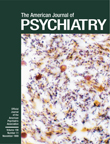Dr. Smith and Colleagues Reply
To the Editor: Dr. Furukawa is justified in calling our attention to negative results in some studies of benzodiazepine when used as monotherapy or to augment tricyclic antidepressant therapy in the treatment of major depression. In retrospect, it may have been desirable to broaden the context of our study of clonazepam’s augmentation of fluoxetine, as he suggested, although it was not our intention to present a comprehensive review of the literature. Instead, we wished to point to some successes in the use of benzodiazepine in treating depression as a part of the basis for extending this practice to the augmentation of selective serotonin reuptake inhibitors. We are not advocating a return to benzodiazepine augmentation of tricyclic antidepressants nor do we recommend benzodiazepine monotherapy in treating depression, even though the latter is not uncommon and may often be successful—for example, when agitated depression has been misdiagnosed as an anxiety disorder. Our highlighting of some positive results of benzodiazepine therapy in the treatment of depression served as a prelude to our research with clonazepam and suggested a more attractive risk-reward ratio concerning this class of drugs. It is our view that, on balance, contemporary negative consensus about the use of benzodiazepines in the treatment of depression has been excessive.



